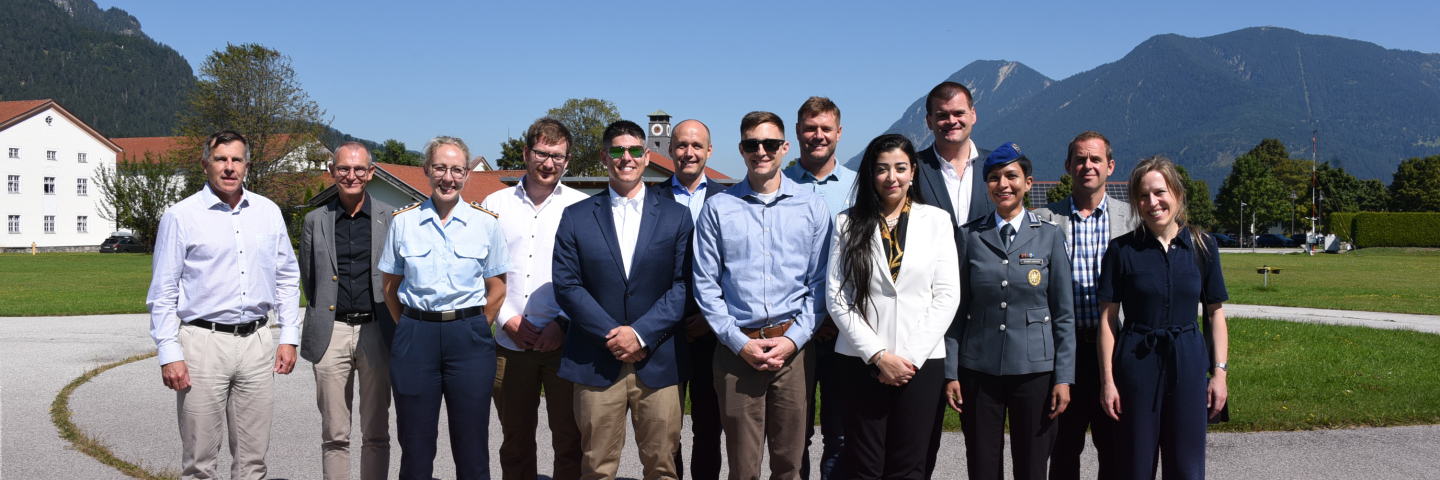Category: Social Sciences
Program Form: Full-Time or Part-Time
Start of Program: Sept. 1 (Full-Time Students)
Place of Study: Garmisch-Partenkirchen
Duration: 12 Months
Workload: 60 ECTS Credit Points
Course Language: English
Tuition Fees: 14.800 € (Discounts for GCMC Alumni)
The Master of Arts in International Security Studies (MISS) is a unique postgraduate program for security professionals offered jointly by the University of the Bundeswehr Munich (UniBwM) and the George C. Marshall European Center for Security Studies. The one-year program is designed to prepare international military and civilian students with professional experience for executive positions in the public- and private-sector.
MISS participants benefit from the particular strengths of the partnering institutions by combining university modules taught by UniBwM professors and international faculty with the policy-oriented programs at the Marshall Center. The program provides a comprehensive understanding of international security and connects participants to a network of more than 16,000 security professionals worldwide.
Five different study concentrations offer participants an opportunity to deepen their understanding and develop professional networks in their specific area of expertise:
- Program on Cyber Security Studies
- Countering Transnational Organized Crime
- Program on Regional Security Studies
- Program on Terrorism and Security Studies
- Seminar on Irregular Warfare/Hybrid Threats
The program is designed for full- and part-time studies and can be completed either as a twelve-month course starting in September or by attending modules individually over a duration of two years. The entire program takes place at the Marshall Center in Garmisch-Partenkirchen.
Admission Process
- Submission of application documents and verification of eligibility
- Invitation to an admission interview
- Offer of a seat in the program and enrollment via firm acceptance form
Admission Requirements
- Completion of a higher education degree (typically four years) accrediting a competence level equivalent to 240 ECTS points (technical degree Diplom, master’s or bachelor’s degree, or an equivalent domestic or foreign qualification usually requiring four years of full-time study)
- Certificate of English language proficiency at CEFR Level B2 (not required for native speakers)
- Successful completion of an admission interview
Examples of Previous Master Theses
- A Realm Divided: Afghanistan and Its Warlords
- Enhancing the Security of the Lake Chad Region through Regional Collaboration
- The Expansion of the Shanghai Cooperation Organization: Determining the Shift in the Global Military Power Balance
- The Turkish and U.S. Constitutions: A Comparative Work
- Power Transition Theory in the 21st Century: More Relevant than Ever or Obsolete?
- Sanctions on Russia: Limits and Flaws in the “Smart Sanctions” Approach?
- The Saudi Identity Crisis of 1979 and its Impact on the Regional Security in the Middle East
- Russian Hybrid Strategies in Ukraine: Undermining Security through Military and Non-Military Measures
- Border Politics: The U.S.-Mexico Case Study
- Cyber Deterrence in Germany: Approaching an Effective Cyber Deterrence Strategy
- The Protracted Western Sahara Dispute: Comparative Analyses of Perspectives from Morocco, POLISARIO Front, and the International Community
- Do Non-Governmental Organizations Undermine Good Governance in Post-Conflict Countries?
- Ghana: A Virtuous Cycle of Stability and Development
- Brexit as an Exit from the Peace Process? The Likelihood of Recurring Political Violence in Northern Ireland
- Understanding Daesh Foreign Fighters in Syria and Iraq: Tunisia as a Case Study
- Mongolian Neutrality Policy
- Iran as a Security Challenge in the Middle East
- Tanzania: A Fertile Ground for Religious Radicalism?
- Morocco: A Beacon in the MENA Region- Civil Society's Efforts in the Drive Towards Open Society and Good Governance
- The Ambiguity of Autonomous Warfare: Technological, Ethical, and Political Implications
- ISIS in Central Asia: Threats and Responses
- Countering Violent Extremism in America: Can CVE Programs Affect U.S. National Security?
- Development Aid in Conflict-Affected Countries: The Performance of Provincial Reconstruction Teams in Afghanistan
Point of Contact
Mr. Robert Becker
Academic Coordinator
Master Program in International Security Studies
Bundeswehr University Munich and George C. Marshall European Center for Security Studies
Gernackerstraße 2, 82467 Garmisch-Partenkirchen
Mobile / WhatsApp: +49 1511-7277-581
Email: iss.casc [at] unibw.de (iss[dot]casc[at]unibw[dot]de)
Website:www.casc.de/miss
